Barun Mukherjee, a politician from All India Forward Bloc, was a Member of the Parliament of India representing West Bengal in the Rajya Sabha, the upper house of the parliament. He was member during April 2006 to 2012 but resigned on 6 May 2008. He was again elected to Rajya Sabha in November 2008 till April 2014.

The Rajya Sabha or Council of States is the upper house of the bicameral Parliament of India. As of 2021 it has a maximum membership of 245, of which 233 are elected by the legislatures of the states and union territories using single transferable votes through Open Ballot while the President can appoint 12 members for their contributions to art, literature, science, and social services. The potential seating capacity of the Rajya Sabha is 250, according to article 80 of the Indian Constitution. Members sit for staggered terms lasting six years, with elections every year with about a third of the 233 designates up for election every two years, in even-numbered years. The Rajya Sabha meets in continuous sessions, and unlike the Lok Sabha, being the lower house of the Parliament, the Rajya Sabha, which is the upper house of Parliament, is not subjected to dissolution. However, the Rajya Sabha, like the Lok Sabha can be prorogued by the President.
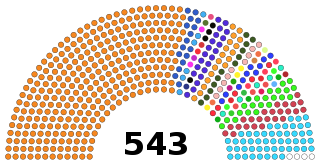
The Lok Sabha, or House of the People, is the lower house of India's bicameral Parliament, with the upper house being the Rajya Sabha. Members of the Lok Sabha are elected by an adult universal suffrage and a first-past-the-post system to represent their respective constituencies, and they hold their seats for five years or until the body is dissolved by the President on the advice of the council of ministers. The house meets in the Lok Sabha Chambers of the Sansad Bhavan, New Delhi.

The Parliament of India is the supreme legislative body of the Republic of India. It is a bicameral legislature composed of the President of India and the two houses: the Rajya Sabha and the Lok Sabha. The President in his role as head of legislature has full powers to summon and prorogue either house of Parliament or to dissolve Lok Sabha. The president can exercise these powers only upon the advice of the Prime Minister and his Union Council of Ministers.
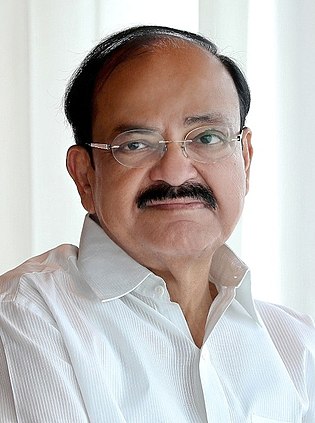
The Vice President of India, officially the Vice President of the Republic of India, is the second-highest constitutional office in India after the President. Article 63 of Indian Constitution states that "There shall be a Vice President of India." The Vice President acts as President in the absence of the president due to death, resignation, impeachment, or other situations.
The 14th Lok Sabha was convened after the 2004 Indian general election held in four phases during 20 April – 10 May 2004, which led to the formation of first Manmohan Singh ministry (2004–2009). Indian National Congress-led United Progressive Alliance won 62 more seats than previous 13th Lok Sabha. The Lok Sabha is the lower house in the Parliament of India. 8 sitting members from Rajya Sabha, the Upper House of Indian Parliament, were elected to 14th Lok Sabha after the 2004 Indian general election.
India has a parliamentary system as defined by its constitution, with power distributed between the central government and the states.

The Speaker of the Lok Sabha is the presiding officer and the highest authority of the Lok Sabha, the lower house of the Parliament of India. The speaker is elected generally in the first meeting of the Lok Sabha following general elections. Serving for a term of five years, the speaker chosen from sitting members of the Lok Sabha,
A Member of the Legislative Assembly (MLA) is a representative elected by the voters of an electoral district (constituency) to the legislature of State government in the Indian system of government. From each constituency, the people elect one representative who then becomes a member of the Legislative Assembly (MLA). Each state has between seven and nine MLAs for every Member of Parliament (MP) that it has in the Lok Sabha, the lower house of India's bicameral parliament. There are also members in three unicameral legislatures in Union Territories: the Delhi Legislative Assembly, Jammu and Kashmir Legislative Assembly Puducherry Legislative Assembly. Only a Member of the Legislative Assembly can work as a minister for more than 6 months. If a non Member of the Legislative Assembly becomes a Chief Minister or a minister, he must become an MLA within 6 months to continue in job. Only a Member of the Legislative Assembly can become Speaker of the Legislature.
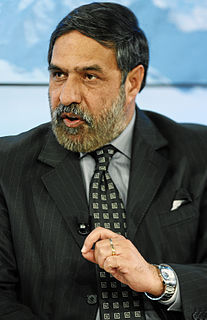
Anand Sharma is an Indian politician and former Union Cabinet Minister in charge of Commerce and Industry and Textiles in the Government of India. Since June 2014, Sharma is the Deputy Leader of opposition in Rajya Sabha, the upper house of the Indian Parliament.
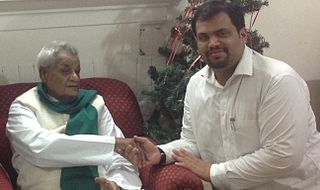
Jai Narain Prasad Nishad was an Indian politician and member of parliament from Muzaffarpur Lok Sabha Constituency in the Indian State of Bihar. He was a Union Minister for State in 1996-1998 and has been a member of Lok Sabha five times and a former member of Rajya Sabha. He was a member of Janata Dal (United) and with the Bharatiya Janata Party. His son, Ajay Nishad is the MP of Muzaffarpur.
Debabrata Biswas,(b. September 28, 1945) is a politician and the General Secretary of the All India Forward Bloc from 1997. He was a Member of the Parliament of India representing West Bengal in the Rajya Sabha, the upper house of the Parliament.
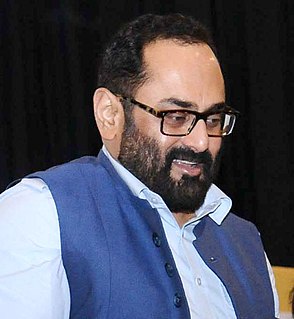
Rajeev Chandrasekhar is a Indian politician from Bangalore and Minister of State for Skill Development and Entrepreneurship and Minister of State for Electronics and Information Technology. He is an Indian politician and entrepreneur, technocrat and a Member of Parliament in the upper house from BJP representing Karnataka. He also served as National Spokesperson of BJP and was vice-chairman of the Kerala wing of the BJP-led coalition National Democratic Alliance.

Prakash Keshav Javadekar is an Indian politician. He is a member of the Bharatiya Janata Party (BJP) who previously served as the Minister of Environment, Forest and Climate Change, Minister of Information and Broadcasting and Minister of Heavy Industries and Public Enterprises between 2014 to 2021.
Yogendra Premkrishna Trivedi is a member of the Nationalist Congress Party of India. He is also a member of the board of directors of Reliance Industries.
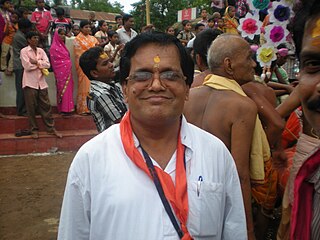
Rabinarayan Mohapatra is an Indian politician from the Biju Janata Dal party. He is a Member of the Parliament of India representing Orissa in the Rajya Sabha, the upper house of the Indian Parliament.
Satya Prakash Malaviya was an Indian Politician and he was elected to the Upper House of Indian Parliament the Rajya Sabha in 1984 and 1990 from Uttar Pradesh as a member of the Janata Dal but rebelled and joined the Samajwadi Janata Party to become the Minister of Parliamentary Affairs in November 1990 till June 1991.

A Member of Parliament in the Rajya Sabha is the representative of the Indian states to the one of the two houses of the Parliament of India. Rajya Sabha MPs are elected by the electoral college of the elected members of the State Assembly with a system of proportional representation by a single transferable vote. Parliament of India is bicameral with two houses; Rajya Sabha and the Lok Sabha. The total number of members of Rajya Sabha are lesser than the Members of Parliament in the Lok Sabha and have more restricted power than the lower house. Unlike membership to the Lok Sabha, membership to the Rajya Sabha is permanent body and cannot be dissolved at any time. However every second year, one third of the members are retired and vacancy are filled up by fresh elections and Presidential nomination at the beginning of every third year.

Member of Parliament in India refers to persons who serve in the Parliament of India. These include:
Babubhai Maneklal Chinai is an Indian politician. He was a Member of Parliament representing Maharashtra in the Rajya Sabha the upper house of India's Parliament. He was awarded India's third highest civilian honour the Padma Bhushan in 1966.